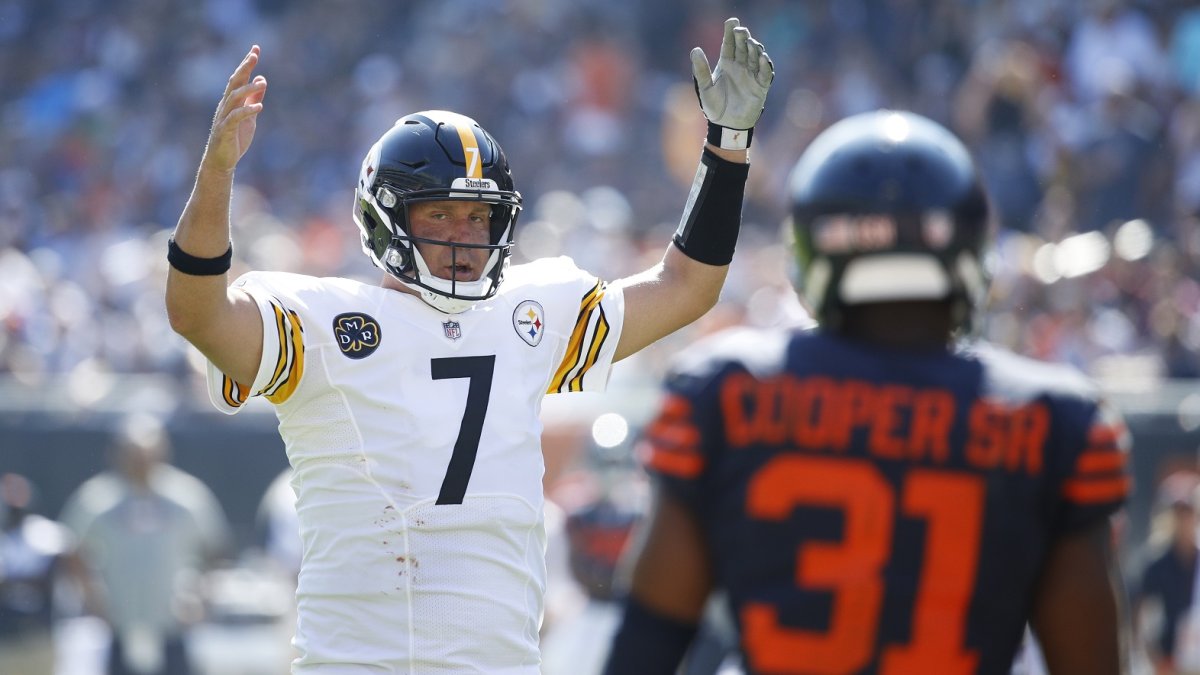Pittsburgh was on most people’s shortlist of the teams entering the 2017 season with a realistic chance to win the Super Bowl, but, 3-1 record aside, they have not lent confidence to those who made that prediction over the first month. In Week 1, they squeaked out a victory in Cleveland against what appears to be another dreadful Browns team. In Week 3, they lost in Chicago to a Bears team that has been outscored by 43 points in four games, just 1 point better than Cleveland. Ben Roethlisberger has yet to reach 270 passing yards or 3 touchdowns in a game. But the one thing Steelers fans can hang their hats on is the schedule. Three of those first four games were on the road, which leaves a lot of home games left on the Steelers’ schedule to right the ship.
I can’t remember when I first heard the theory that Roethlisberger tends to play poorly on the road, but it has become loud after he threw for 235 and 216 yards and 2 total touchdowns over the last two weeks, both away from Heinz Field. Frankly, that was something I had never paid much attention to. My typical fantasy team-building strategy relies on one quarterback, which lets me fill my roster with upside plays at running back and wide receiver. But now that so much of fantasy play centers on DFS, having a clear understanding of a quarterback’s matchup benefits or detriments is critical. And I think I already have a solid foundation to figure this one out.
A few weeks ago, I did some research on the effects of domes for players that established benchmarks for what quarterbacks would gain and lose when they went on the road. Using that as a starting place, I adjusted quarterbacks’ road statistics as if they had played at home. Then, I could compare their per-game adjusted road totals to their real home totals. I did that from 2009 to 2016. If a quarterback had the same adjusted road and real home totals per game, then his home-field advantage was average. But some players showed some pretty big deviation from average over significant samples, and it turns out that Roethlisberger leads the way.
| Quarterbacks with the Biggest Fantasy Home-Field Advantage | |||
| Player | Team | Games | Extra Home FanPPG |
| Ben Roethlisberger | PIT | 113 | +3.8 |
| Drew Brees | NO | 126 | +3.2 |
| Joe Flacco | BLT | 122 | +2.8 |
| Eli Manning | NYG | 128 | +1.8 |
| Aaron Rodgers | GB | 110 | +1.5 |
Roethlisberger gains some moderate extra advantage with 16.2 extra passing yards and 0.2 fewer interceptions per game than expected at home, but he does the bulk of his damage with 0.7 extra passing touchdowns per game at home. Drew Brees is close to him with 0.6 extra passing touchdowns per game at home, and then no other active quarterback has shown more than half of that touchdown benefit.
I’ve labeled this phenomenon as home-field advantage, but it could just as easily be road-field disadvantage or some characteristic of certain quarterbacks that make them experience bigger-than-normal home/road splits. Before I restricted my results to only current starting quarterbacks, I noticed that Ryan Fitzpatrick was in the top 10 for three different teams out of the 91 player-teams I researched since 2009. That’s a guy who likes his own bed, I guess.
Meanwhile, a home field can have the opposite impact on a quarterback, as it has with Trevor Siemian.
| Quarterbacks with the Smallest Fantasy Home-Field Advantage | |||
| Player | Team | Games | Extra Home FanPPG |
| Trevor Siemian | DEN | 14 | -3.5 |
| Blake Bortles | JAX | 46 | -3.5 |
| Jameis Winston | TB | 32 | -2.4 |
| Andy Dalton | CIN | 93 | -1.8 |
| Philip Rivers | SD | 128 | -1.4 |
I don’t think these numbers imply that Denver makes it harder for Siemian to be effective as passer. Instead, I suspect that Denver has maybe the biggest actual home-field advantage, and that manifests itself in the Broncos gaining big leads and then shifting to a run-heavy approach to kill clock and take advantage of a defense that is not conditioned for thin air late in games. I see something similar with Blake Bortles, who has likely had more of a chance to benefit from his garbage-time predilections on the road. Philip Rivers is probably the only quarterback I would speculate has had a real home-field disadvantage in San Diego. And based on the early returns on the fan base attendance in Los Angeles, I wouldn’t be surprised to see that trend continues for him this year.



 © 2025 PFF - all rights reserved.
© 2025 PFF - all rights reserved.